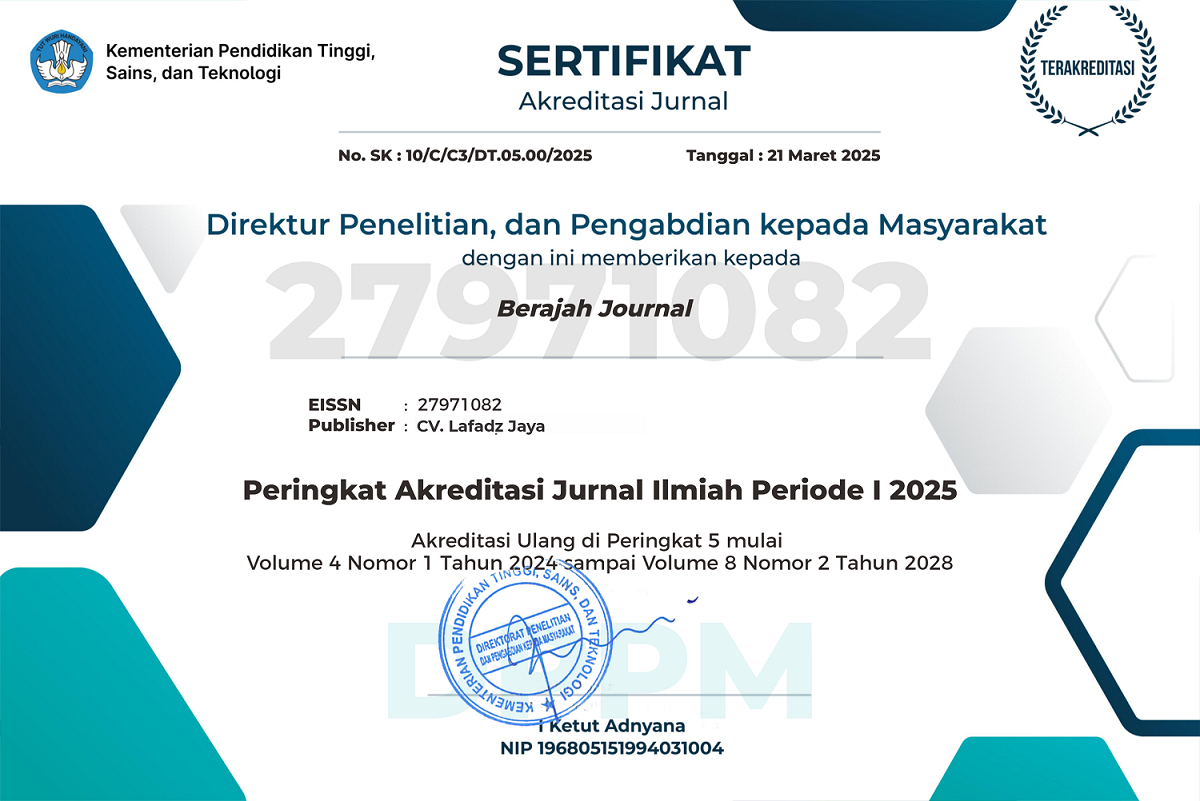PENGEMBANGAN TUJUAN KURIKULUM PENDIDIKAN AGAMA ISLAM
DOI:
https://doi.org/10.47353/bj.v4i3.344Keywords:
PAI Curriculum, Curriculum Objectives, Curriculum Development, Islamic Religious Education, Mixed MethodsAbstract
This study aims to develop PAI curriculum objectives that are more relevant, contextual, and comprehensive. The research method used was a qualitative approach with data collection techniques through literature study, observation, and in-depth interviews with educational experts and practitioners. The data were analyzed descriptively and inferentially using thematic and statistical analysis. The results showed that the objectives of the PAI curriculum developed should include aspects of strengthening aqidah, deepening religious knowledge, practicing worship, forming noble morals, and developing life skills based on Islamic values. The principles used in the development of PAI curriculum objectives include the balance between spiritual and material aspects, contextuality, and relevance to the needs of the times. The development strategies applied include revitalizing the curriculum, improving the quality of teachers, strengthening partnerships with parents and communities, and utilizing technology in learning. The implication of this study is the production of PAI curriculum objectives that are more comprehensive, in line with the times, and able to answer global challenges. The PAI curriculum developed is expected to provide adequate provision for students in facing global challenges and become a generation that is faithful, knowledgeable, noble, and able to contribute positively to society.
Downloads
References
Achmad, B. (2014). Tipologi Filsafat Pendidikan Islam dan Implementasinya dalam Pengembangan Kurikulum. Edukasi, 2(1), 55.
Anas, Z. (2014). Hitam Putih Kurikulum 2013. Jakarta: AMP Press.
Aprilia, W. (2020). Organisasi dan Desain Pengembangan Kurikulum. Islamika: Jurnal Keislaman Dan Ilmu Pendidikan, 2(2), 210.
Arifandi, A., Billah, M. E. M., & Suwardi. (2022). Pengembangan Kurikulum Pendidikan. Jurnal Pendidikan Dan Kajian Aswaja, 8(1), 1–18.
Asmariani. (2014). Prinsip-Prinsip Pengembangan Kurikulum Dalam Perspektif Islam. Jurnal Al-Afkar, 3(2), 61.
Baderiah. (2018). Pengembangan Kurikulum. Palopo: Lembaga Penerbit Kampus IAIN Palopo.
Bisri, M. (2020). Komponen-Komponen dan Model Pengembangan Kurikulum. Prosiding Pascasarjana IAIN Kediri, 102.
Bustoni, A. A. (2010). Pengembangan Kurikulum: Berdasarkan Isu dan Problematika.Jakarta: Multi Kreasi Satudelapan.
Hamalik, O. (2016). Dasar-Dasar Pengembangan Kurikulum. Bandung: Remaja Rosdakarya. Hamdan. (2009). Pengembangan dan Pembinaan Kurikulum: Teori dan Praktek Kurikulum PAI. Banjarmasin.
Hamid, H. (2012). Pengembangan Kurikulum Pendidikan. Bandung: CV. Pustaka Setia. Hanafi, M. (2014). Pengembangan Kurikulum Perguruan Tinggi Agama Islam. Islamuna, 1(2), 282.
Hasan, M. S. (2017). Pengembangan Kurikulum Pendidikan Agama Islam Terpadu di Sekolah. Jurnal Al-Ibrah, 2(1), 60–87.
Idi, A. (2007). Pengembangan Kurikulum. Jogjakarta: Ar-Ruzz Media.
Julaeha, S. (2019). Problematika Kurikulum dan Pembelajaran Pendidikan Karakter. Jurnal Penelitian Pendidikan Islam, 7(2), 174.
Downloads
Published
How to Cite
Issue
Section
License
Copyright (c) 2024 Saifullah, Rabiatul Adawiyah, Salamah

This work is licensed under a Creative Commons Attribution 4.0 International License.






















